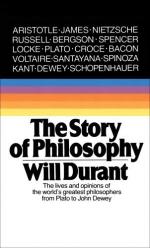|
This section contains 1,472 words (approx. 4 pages at 400 words per page) |

|
"At first this philosophy was physical; it looked out upon the material world and asked what was the final and irreducible constituent of things. The natural termination of this line of thought was the materialism of Democritus (460-360 B.C.)—'in reality there is nothing but atoms and space.' This was one of the mainstreams of Greek speculation; it passed underground for a time in Plato's day, but emerged in Epicurus (342-270 B.C.), and became a torrent of eloquence in Lucretius (98-55 B.C.)." Chapter 1, p. 3.
"Philosophy begins when one learns to doubt—particularly to doubt one's cherished beliefs, one's dogmas and one's axioms. Who knows how those cherished beliefs became certainties with us, and whether some secret wish did not furtively beget them, clothing desire in the dress of thought? There is no real philosophy until the mind turns round and examines itself...
|
This section contains 1,472 words (approx. 4 pages at 400 words per page) |

|




